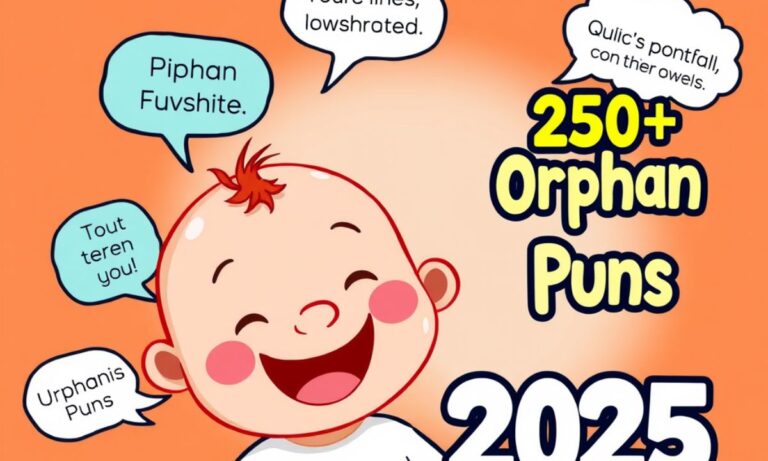Are you searching for some uniquely humorous laughter and tears? than our comprehensive collection of orphan puns and jokes that masterfully blend dark humor with clever wordplay.
These parentless punchlines offer a distinctive form of comedy that acknowledges life’s challenges while finding moments of levity.
Whether you appreciate self-deprecating humor or enjoy the unexpected twists of family-themed wordplay, our curated list of 250+ orphan jokes provides both entertainment and thoughtful reflection on how humor helps us navigate sensitive topics with grace and understanding.
READ MORE: https://fashiongravity.co.uk/negative-words-that-start-with-z-in-2025/
Best Orphan Puns So Bad They’ll Make You Laugh Then Cry
Orphan humor represents a unique category of comedy that balances on the edge of sensitivity and humor, offering unexpected punchlines that often catch listeners off guard.
These parentless puns create moments of surprised laughter through their clever wordplay about family absence, making them particularly memorable in their delivery.
What makes these jokes distinctive is their ability to transform potentially somber subjects into opportunities for shared laughter, demonstrating how humor can serve as a powerful coping mechanism.
By embracing solo jokes and single punchlines, this collection showcases how comedy can acknowledge difficult realities while still finding moments of genuine connection through shared smiles.
- I told an orphan a joke… but it went over their head — like a roof they don’t have.
- Orphans love self-checkout. It’s the only time someone calls them “family.”
- I asked the orphan if they had a family plan. They said, “No, just single coverage.”
- Orphans make great astronauts — they’re used to space.
- I threw an orphan a surprise party. Nobody showed up… even they didn’t know who to invite.
- Why don’t orphans play baseball? They don’t know where home is.
- I told an orphan to call their parents… but it was a long-distance relationship.
- Orphan chess champions are unbeatable — they have no attachments to lose.
- Orphans love boomerangs — it’s the only thing that comes back.
- My friend said I had no sense of belonging. I told him I was just being orphan-ticated.
- Why are orphans so good at hide and seek? No one is looking for them anyway.
- Orphans excel at minimalism — they’ve mastered living with no strings attached.
- I tried to sell an orphan a family plan — turns out it was just unlimited loneliness.
- Orphans don’t get grounded… no one’s there to ground them.
- The orphan was great at writing — every essay was a personal independent study.
- I told the orphan they were adopted. They said, “That’s the dream.”
- Why are orphans great magicians? They know how to make people disappear.
- Orphans don’t get hand-me-downs… but life sure handed them down.
- What’s an orphan’s favorite band? No Doubt.
- Orphans hate autocorrect — every time they type “Mom,” it says “unknown contact.”
- The orphan wrote a memoir. It was a self-made story.
- Why did the orphan become a chef? They had nothing but thyme on their hands.
- Orphans make great independent filmmakers… because no one directs them.
- Orphans don’t play Monopoly — no family game nights.
- The orphan got cast in a soap opera — they had plenty of unresolved issues.
- Why did the orphan start a band? They needed backup.
- Orphans are amazing at solo karaoke — no one duets with them.
- The orphan loved camping — it was the closest they got to a family tree.
- Orphans make great actors — they’ve been faking smiles forever.
- I asked the orphan to join our family group chat. They said, “That’ll be a short convo.”
- Orphans love DIY projects — they build their own support.
- Why don’t orphans text at dinner? Because no one texts back anyway.
- Orphans excel at poker — they’ve got no tells to give away.
- What’s an orphan’s favorite TV show? Stranger Things.
- Orphans are great at puzzles — because they’ve always felt like the missing piece.
- I told the orphan they were one-of-a-kind. They said, “Yeah, life made sure of it.”
- Orphans never get embarrassed at family reunions — because there are none.
- Why don’t orphans use emergency contacts? Because 911 is their only family.
- Orphans don’t lose friends — they just orphan them.
- I asked the orphan if they wanted to be my +1. They said, “I’ve been solo all my life.”
- Orphans love minimal apps — no “Mom calling” notifications.
- What’s an orphan’s favorite holiday? Independence Day.
- Orphans excel at climbing — they’ve been uprooted before.
- Why do orphans love group therapy? It’s the closest they get to family dinner.
- Orphans are great drivers — no one’s yelling “Are we there yet?”
- I told the orphan to call home — they asked, “What’s the number to nowhere?”
- Why did the orphan become a detective? To find leads.
- Orphans don’t cry over spilled milk — they’ve seen worse spills.
- Orphans are great at open mic nights — because they’re always solo.
- What do orphans call bedtime stories? Autobiographies.
Orphan Puns: A Humorous Look at a Sensitive Topic
Exploring orphan puns requires acknowledging the delicate balance between humor and sensitivity, as these jokes navigate the complex territory of missing parent jokes with surprising deftness.
The best orphan wordplay manages to find humor without diminishing the genuine emotional experiences associated with family absence, creating a unique form of comedy that acknowledges reality while offering relief.
These parentless puns often incorporate elements of found family humor, suggesting that connections can be formed even when traditional family structures are absent.
Through careful crafting, orphan comedy can actually promote understanding and empathy, demonstrating how humor serves as both entertainment and a way to process challenging aspects of the human experience.
- Orphans are always self-made — no strings attached.
- Orphans make the best independent artists — they were born solo.
- An orphan’s favorite holiday? Independence Day, of course.
- Orphans are naturals at solo karaoke — they’ve been practicing duets alone for years.
- Why are orphans great travelers? No one asks them to come home early.
- Orphans make great authors — their stories always start with “Once upon no time at home.”
- The orphan got into stand-up comedy — it’s easier when you have no parents to embarrass.
- Why don’t orphans get homesick? You have to have a home first.
- Orphans ace escape rooms — they’ve been finding their way out since day one.
- Orphans are great at improv — they’ve been making it up as they go along.
- Orphans never forget their roots — because they’re still looking for them.
- An orphan’s favorite game? Solitaire, obviously.
- Orphans don’t get grounded — no one’s there to ground them.
- Orphans excel at freestyle rap — no family ties to hold them back.
- The orphan became a software engineer — they’re experts in orphaned code.
- Orphans love minimalism — it’s easy when you start with nothing.
- What’s an orphan’s favorite sport? Track — they’re always running solo.
- Orphans are pros at selfies — no need to squeeze in relatives.
- Orphans never have to fight over inheritance — there’s no competition.
- Why did the orphan become a detective? They’re used to searching for clues about their past.
- Orphans love podcasts — no family interruptions.
- Orphans are experts in DIY — because sometimes, you have to raise yourself.
- What’s an orphan’s favorite dance move? The lonely shuffle.
- Orphans make great secret keepers — there’s no family to spill to.
- Why do orphans like group chats? It’s the closest thing to a family reunion.
- Orphans are amazing at meditation — they’ve mastered inner peace out of necessity.
- Orphans don’t have curfews — freedom is the default.
- The orphan opened a bakery — finally, something they could raise on their own.
- Orphans make great adventurers — no one’s telling them to stay safe at home.
- Why don’t orphans get homesick at summer camp? It’s just another sleepover with strangers.
Adopting Orphan Puns: Finding the Laughter
Embracing orphan jokes means recognizing their unique ability to highlight resilience through humor, as they often celebrate the strength found in navigating life independently.
These adoption jokes frequently incorporate themes of “starting from scratch” and independent lifestyle jokes that acknowledge challenges while finding unexpected humor in solo living situations.
By focusing on self-sufficiency and adaptability, many orphan puns transform potentially difficult circumstances into opportunities for creative wordplay and surprising punchlines.
The best examples in this category demonstrate how family-less humor can actually celebrate the diverse ways people create meaning and connection, showcasing the remarkable human capacity to find laughter even when traditional family structures are absent.
- I adopted an orphan pun — turns out it came with no strings attached.
- Adopting an orphan is like adopting a cat — you just hope they don’t disappear for days.
- I told my new adoptive kid, “You’re the missing piece I didn’t know I lost.”
- Our family tree just got a brand new branch — and it’s already thriving.
- Adopting is like building IKEA furniture — some assembly (of emotions) required.
- We adopted a child and instantly leveled up — now we’re a full house.
- My adopted kid said they felt out of place — I said, “You’re homegrown now.”
- Adopting is the ultimate DIY family project.
- Our adoption papers are filed under “Made with love.”
- I told my adopted child, “You’re pre-loved, but still top-shelf.”
- We didn’t give birth — but we labored through the paperwork.
- I adopted patience along with my child — it was a package deal.
- Our family portrait now includes a limited edition member.
- Our house is like Wi-Fi now — everyone’s connected.
- We adopted a kid and upgraded from “party of two” to family mode.
- Adoption is just family remix — same love, new beats.
- My new kid didn’t fall far from the tree… because we planted them here.
- We didn’t share DNA, but we sure share a LOL gene.
- Adoption made our hearts open-source.
- We adopted an orphan, and suddenly, there’s more laughter in the echo.
- Our family recipe needed one more ingredient — we adopted spice.
- Adoption: proof that family isn’t always by blood, but by bad jokes.
- I didn’t give you life — but I’ll give you the WiFi password forever.
- Our adoption story is my favorite plot twist.
- We adopted love — and the warranty is lifetime.
- We didn’t adopt a child… we adopted endless dad jokes opportunities.
- My adopted kid asked if they fit in — I said, “You’re the punchline we needed.”
- Adoption turned our house into a home with bonus levels.
- Our family tree is a grafted masterpiece.
- Adopting an orphan is like finding an old song — you instantly know all the words.
Orphan Jokes: Navigating the Line Between Funny and Heartfelt
Creating effective orphan humor requires understanding the fine line between comedy and compassion, as the most memorable jokes balance witty observations with genuine emotional resonance.
These parentless punchlines often incorporate elements of absent family puns while maintaining respect for the real experiences that inspire them, demonstrating a thoughtful approach to sensitive humor.
The most successful orphan jokes avoid mockery and instead focus on clever wordplay about roots and origins, creating moments of unexpected connection through shared laughter.
By acknowledging the complexities of family absence while still finding opportunities for humor, these jokes showcase how comedy can serve as both entertainment and a subtle form of validation for diverse life experiences.
- Orphans don’t just break the mold — they build a new one from scratch.
- What do you call an orphan who writes poetry? A self-published author.
- Orphans are proof that roots aren’t everything — wings matter too.
- Why did the orphan ace the test? They always think independently.
- Orphans don’t follow footsteps — they make their own path.
- What’s an orphan’s favorite subject? History — they love making their own.
- Orphans are like stars — they shine brightest in the darkest skies.
- Why did the orphan join the debate team? No one argues stronger than someone who stands alone.
- Orphans don’t need a family tree to know they’ve got strong branches.
- What’s an orphan’s favorite exercise? Self-reflection.
- Orphans are like lone wolves — resilient and resourceful.
- Why are orphans such great leaders? They know how to carry themselves.
- Orphans don’t throw pity parties — they host celebrations of strength.
- What do you call an orphan who’s always smiling? Self-sufficient sunshine.
- Orphans don’t get grounded — they keep rising.
- Why do orphans write the best songs? Their lyrics come straight from the heart.
- Orphans know the value of chosen family — and they choose wisely.
- Orphans don’t get lost — they’re experts at finding their way.
- Why are orphans great adventurers? Every journey feels like home.
- Orphans aren’t missing pieces — they’re whole puzzles in motion.
- Orphans don’t follow maps — they chart their own course.
- What do you call an orphan with a dream? A future in the making.
- Orphans are fluent in the language of resilience.
- Why did the orphan become a chef? They know how to make something beautiful from nothing.
- Orphans don’t just survive — they thrive.
- Orphans are the masters of self-discovery.
- Why did the orphan win the race? No one could keep up with their determination.
- Orphans don’t look back — they look ahead to what’s possible.
- Orphans write their own fairy tales — no glass slippers needed.
- Why are orphans great dancers? They’ve got moves that come from deep within.
- Orphans don’t break — they bend and bounce back.
- What’s an orphan’s favorite accessory? Confidence.
- Orphans aren’t lonely — they’re legends in the making.
- Why did the orphan become an artist? They know how to paint their own picture.
- Orphans don’t need luck — they’ve got grit.
- What do you call an orphan who keeps trying? A champion of comebacks.
- Orphans don’t just fit in — they stand out.
- Why are orphans great storytellers? Their lives are already bestsellers.
- Orphans are experts at making family out of friends.
- Orphans don’t fear the unknown — they’ve faced it head-on.
- Why did the orphan start a band? They already know how to march to their own beat.
- Orphans don’t get overshadowed — they become the light.
- What’s an orphan’s favorite song? “I Will Survive.”
- Orphans don’t just build walls — they build bridges too.
- Why are orphans great teachers? They know lessons life doesn’t put in textbooks.
- Orphans don’t stay down — they rise with style.
- What do you call an orphan on a mission? Unstoppable.
- Orphans don’t search for perfection — they create meaning.
- Why did the orphan win the spelling bee? Because resilience spells success.
- Orphans don’t need fairy godmothers — they’re their own magic.
The Psychology Behind Orphan Humor: Why We Laugh
The psychology of orphan humor reveals fascinating insights about how humor functions as a coping mechanism, allowing us to process challenging emotions through the safe distance of cleverly crafted jokes. These parentless puns often employ self-deprecating humor that acknowledges difficulties while reclaiming narrative control, transforming potential vulnerability into moments of empowerment through laughter. Research suggests that engaging with dark humor about sensitive topics like family absence can actually promote psychological resilience by providing emotional release and perspective. By examining why we laugh at orphan jokes, we gain valuable understanding about humor’s role in helping humans navigate complex emotions and find connection even in discussing challenging life circumstances.
- Orphans don’t just cope — they punch back.
- Laughter for orphans isn’t escape — it’s adoptive therapy.
- Why did the orphan become a psychologist? They already knew how to self-analyze.
- Orphan humor is like a defense mechanism — but with better punchlines.
- Orphans don’t have baggage — they have carry-on resilience.
- Why are orphan jokes clever? They’re independently witty.
- Orphans process grief like WiFi — it’s all about connection issues.
- Orphans don’t just laugh at life — they laugh through it.
- Humor is how orphans turn parental absence into present confidence.
- What’s an orphan’s favorite psychological theory? Attachment issues — but make it funny.
- Orphans use humor like duct tape — it holds everything together.
- Why did the orphan love Freud? Because even he had mommy issues.
- Orphan jokes prove that humor is nurture over nature.
- What do you call an orphan comedian? A stand-alone stand-up.
- Orphans laugh because tears are so last season.
- What’s an orphan’s favorite coping strategy? Punchlines over punchbags.
- Orphans don’t crack under pressure — they crack jokes.
- Why are orphan jokes sharp? They’ve been refined by resilience.
- Orphans make the best comedians — no need to clear it with the parents first.
- Humor helps orphans turn trauma into comma — a pause, not an ending.
- Orphans don’t bottle it up — they pop jokes instead.
- What’s an orphan’s favorite genre? Dark comedy — it mirrors life.
- Orphans don’t ghost people — life already gave them plenty of haunts.
- Orphan humor is like jazz — it’s all about improvising through pain.
- Why do orphans laugh at bad times? Because they parent themselves emotionally.
- Orphans are fluent in sarcasm — it’s their second mother tongue.
- Orphan jokes are bittersweet — like dark chocolate therapy.
- Humor is how orphans reparent their feelings.
- Why did the orphan go into comedy? Because every laugh was self-adopted.
- Orphan humor teaches us: if you can’t find a shoulder, build your own punchline pillow.
- Orphans don’t fear vulnerability — they just roast it lightly.
- Humor turns an orphan’s backstory into front-stage brilliance.
- Why are orphans so introspective? Their mirror talks back in dad jokes.
- Orphans aren’t broken — their jokes are just limited edition.
- Humor flips the script from abandonment to abundant wit.
- Orphans don’t cry over spilled milk — they just make cheese jokes.
- What’s an orphan’s comedy style? Solo but solid.
- Orphans don’t repress emotions — they express punchlines.
- Humor is the orphan’s way of saying, “I got this.”
- Why do orphans laugh so loud? Because silence has been too familiar.
Orphan Puns and Wordplay: A Linguistic Exploration
From a linguistic perspective, orphan puns demonstrate remarkable creativity in their wordplay, often utilizing double meanings and unexpected associations related to concepts of independence and origin.
These family-less jokes showcase the flexibility of language through clever manipulations of terms like “roots,” “solo,” and “starting from scratch,” creating surprising connections that generate humor through linguistic subversion.
Analyzing orphan wordplay reveals sophisticated patterns of semantic manipulation, where expected phrases take unexpected turns to highlight both the challenges and unique perspectives associated with absent family structures.
This linguistic exploration demonstrates how orphan humor represents not just comedy but a sophisticated form of communication that navigates complex emotional terrain through the precise manipulation of language and cultural references.
- Orphans don’t just make sentences — they make independent clauses.
- What’s an orphan’s favorite part of speech? The singular pronoun.
- Orphans don’t use conjunctions — they stand alone just fine.
- Orphan humor is full of ellipses… because some stories trail off.
- Orphans aren’t just self-made — they’re self-edited.
- What’s an orphan’s favorite punctuation? The apostrophe — always possessing something on their own.
- Orphans don’t split infinitives — they split expectations.
- Why did the orphan excel at Scrabble? Because they always make their own words count.
- Orphans don’t end sentences with prepositions — they end them with resilience.
- Orphans don’t need a thesaurus — they’ve mastered synonyms for strength.
- What do you call an orphan’s autobiography? A one-author volume.
- Orphans don’t diagram families — they diagram futures.
- Orphan jokes have no parenthetical explanations — they speak for themselves.
- Orphans are like compound words — strong alone, stronger together.
- Why did the orphan love palindromes? Because they always come back to themselves.
- Orphans don’t rely on footnotes — they write the main text boldly.
- Orphans don’t need prefixes — they’re already complete words.
- What’s an orphan’s favorite tense? The future perfect — because they know they’ll have made it.
- Orphans don’t just conjugate verbs — they reinvent action.
- Orphans are pros at anagrams — they rearrange life into meaning.
- Why are orphans great poets? They rhyme independence with brilliance.
- Orphan humor is like irony — layered and sharp.
- Orphans don’t use filler words — every word earns its place.
- What’s an orphan’s favorite literary device? Alliteration — because they appreciate patterns they create themselves.
- Orphans don’t ask rhetorical questions — they answer them with action.
- Orphans write in boldface — no italics of uncertainty here.
- Orphan jokes are metaphors for making sense out of senselessness.
- Why do orphans love dictionaries? Because they define themselves.
- Orphans don’t need dialogue tags — their voice is unmistakable.
- Orphans punctuate life with exclamation points, not question marks.
Orphan Jokes in Popular Culture: From Literature to Film
Throughout entertainment history, orphan characters have occupied a significant place in storytelling, from classic literary figures like Oliver Twist to beloved film characters who navigate the world without traditional family structures.
These cultural representations have influenced how orphan humor appears in popular media, with writers using absent family puns to highlight both challenges and unexpected strengths of characters who must forge their own paths.
Films and literature frequently employ orphan storytelling as a narrative device, using humor to balance poignancy while creating memorable characters whose family absence becomes part of their unique identity and appeal.
This cultural tradition demonstrates how orphan jokes in entertainment serve multiple purposes – providing humor while also offering representation and acknowledgment of diverse family experiences.
- Oliver Twist didn’t just ask for more — he asked for more plot twists.
- Batman isn’t just the Dark Knight — he’s the Patron Saint of Orphan Vigilantes.
- Harry Potter didn’t just defeat Voldemort — he orphaned the villain.
- Annie doesn’t need tomorrow — she rewrote her own Broadway script yesterday.
- Luke Skywalker didn’t just join the Force — he joined the no-parents club.
- Cinderella didn’t lose a slipper — she slipped into a new narrative.
- Spider-Man’s origin story proves that with great loss comes great punchlines.
- Lemony Snicket’s Baudelaire orphans didn’t just survive misery — they narrated it with wit.
- Matilda didn’t just move objects — she moved past neglect into empowerment.
- Superman isn’t just faster than a speeding bullet — he’s faster than an adoption paper.
- Dorothy didn’t just go over the rainbow — she parented herself back home.
- Jane Eyre didn’t just find love — she found self-authorship first.
- Frodo Baggins didn’t just carry the Ring — he carried generational independence.
- Mowgli didn’t just live in the jungle — he wildly redefined family.
- Elsa didn’t just let it go — she let go of royal expectations and parental shadows.
Crafting Clever Orphan Puns: Tips and Tricks
Creating effective orphan puns requires balancing creativity with consideration, focusing on clever wordplay that highlights independence rather than loss to generate genuine humor.
The best orphan jokes often incorporate concepts like “single serving” and “lone star metaphors” that acknowledge solo living while finding unexpected humor in situations others might overlook.
When crafting these parentless punchlines, consider using surprising contrasts between expectations and reality, such as jokes about “family trees” becoming “saplings” or “solo adventures” instead of “family vacations.”
Remember that successful orphan comedy typically avoids pity while celebrating resilience, creating jokes that acknowledge challenges while finding genuine humor in the unique perspectives that come from navigating life independently.
- Orphan puns work best when they stand alone — just like their subject.
- When in doubt, adopt a double meaning — it’s the fastest route to wit.
- The best orphan puns are like orphans themselves — self-sufficient and punchy.
- Don’t be afraid to parent your punchline — but let it emancipate quickly.
- A clever orphan pun leaves no guardian — just a trail of smiles.
- Mix abandonment themes with attachment words — that irony lands every time.
- For sharper humor, focus on independence — it’s an orphan’s linguistic superpower.
- Orphan puns benefit from strong verbs — after all, action speaks louder than lineage.
- Adopt ambiguity — it’s where orphan jokes naturally thrive.
- The best puns don’t need family trees — they grow wild and free.
- Juxtapose loneliness with resilience — that tension sparks the biggest laughs.
- Wordplay shines when you build it like an orphan’s story — unexpected but full of heart.
- A solo subject deserves a solo punchline — keep it clean and clear.
- Don’t overexplain — like a good orphan joke, it should find its own home.
- Remember: crafting orphan puns is about giving words independence — and letting them flourish.
Ethical Considerations When Using Orphan Jokes: A Guide
When sharing orphan humor, ethical considerations must guide our approach, ensuring jokes celebrate resilience rather than minimizing genuine challenges associated with family absence.
The best practice involves asking whether the humor punches up rather than down, focusing on clever wordplay and observations about navigating independence rather than mockery of vulnerable situations.
Consider the context and audience when sharing parentless puns, as jokes that might be empowering in some settings could feel insensitive in others where personal experiences with family absence are particularly raw.
Ultimately, responsible use of orphan humor acknowledges boundaries in family-related jokes while recognizing that when thoughtfully crafted, this humor can actually create connection and understanding across diverse life experiences.
- When crafting orphan puns, make sure the punchline doesn’t fall flat — give it some support.
- Orphan puns work best when they’re independent, not relying on too much context.
- The key to a good orphan pun? Always stand alone — don’t rely on too many other jokes.
- When crafting orphan humor, focus on their ability to stand tall despite life’s challenges.
- To craft a clever orphan pun, always make sure the setup is solid, but the punchline is self-sufficient.
- Think of orphan puns as building blocks — start small and grow your humor from there.
- Crafting an orphan pun is like writing an autobiography — the joke is all about their personal growth.
- The best orphan puns are like resilient characters — they never need to lean on others.
- An effective orphan pun doesn’t need much explanation — it should be clear from the start.
- When making orphan puns, it’s important to stay grounded, but also give them room to soar.
- The best orphan puns play with independence — so avoid overly complicated wordplay.
- Orphan puns are best when they fly under the radar but still leave an impact.
- If you want your orphan pun to shine, always remember: it should be distinct and unforgettable.
- When crafting an orphan pun, focus on the power of resilience — it’s what makes the joke hit harder.
- A clever orphan pun stands tall and doesn’t apologize — it’s confident in its punchline.

I’m Irfan, an experienced SEO content and SEO specialist with 2 years of expertise, currently contributing to Al Jazeera News Website.





